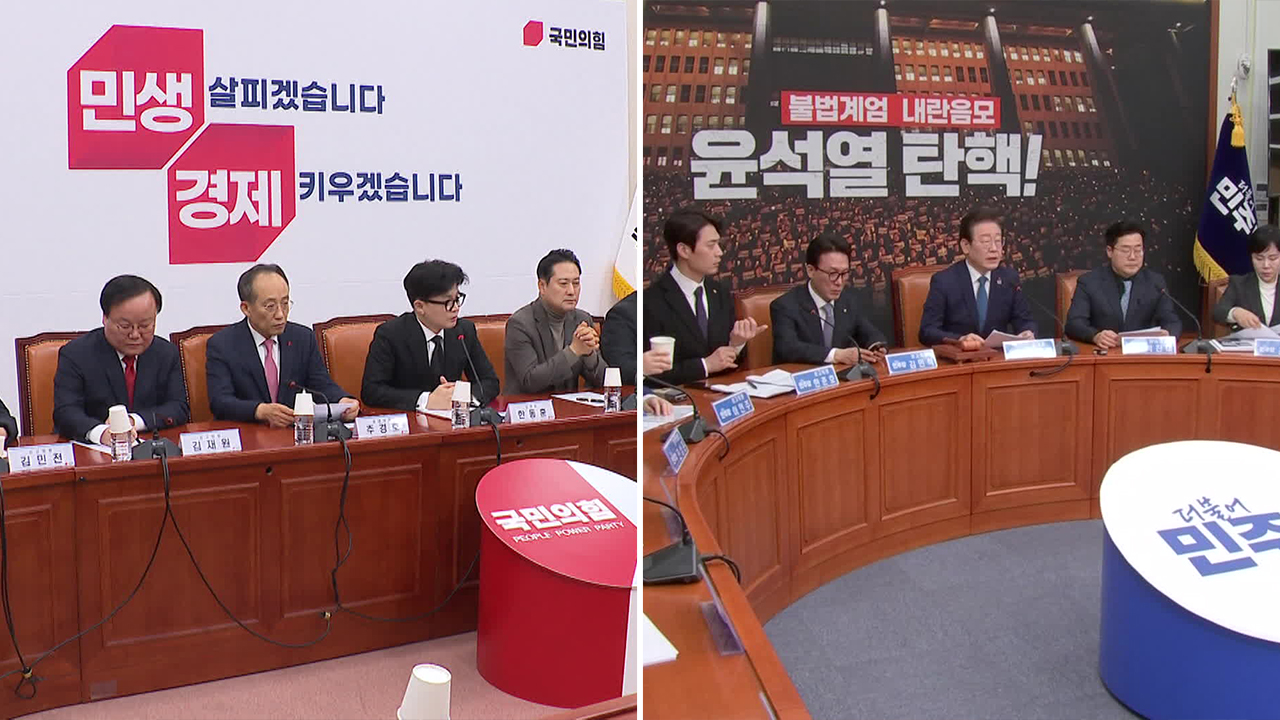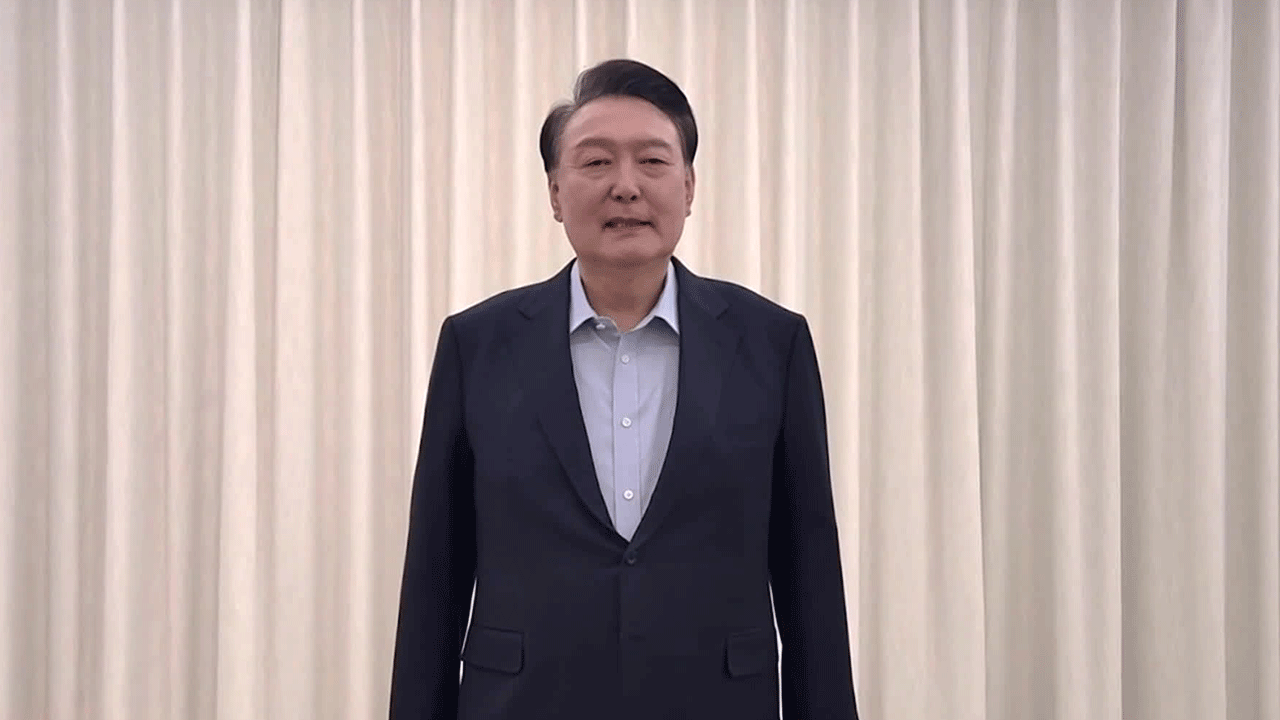Impeachment battle heats up amid ruling party resistance
입력 2024.12.06 (00:01)
읽어주기 기능은 크롬기반의
브라우저에서만 사용하실 수 있습니다.
[Anchor]
Now, let's take a look at where this impeachment situation is headed with reporter Woo Jung-hwa.
Welcome, reporter Woo.
The biggest concern, of course, is whether the impeachment will pass, right?
The ruling party is opposing it as a party line, so what is the likelihood of it passing?
[Reporter]
As I have mentioned repeatedly, for the impeachment bill to pass, more than 200 out of 300 members must vote in favor.
The opposition bloc has 192 members, so if all of them vote in favor, at least 8 defections from the People Power Party would be required.
As reported earlier, even though the People Power Party has decided to oppose it as a party line, there are variables that could shake their unity, so the party is deeply concerned.
[Anchor]
Let's consider the possible scenarios.
Simply put, if it passes, what kind of situation will unfold?
[Reporter]
Looking back at the impeachment of former President Park Geun-hye, the political initiative completely shifted to the opposition due to the national investigation and special prosecutor's investigation.
Ultimately, the Constitutional Court ruled in favor of the impeachment, and a snap election was held, during which the ruling party was unable to exert any real power and lost the government.
This time, the impeachment situation is unfolding due to the declaration of the martial law and allegations of insurrection against the president.
The opposition is simultaneously pushing for a special prosecutor's investigation alongside the impeachment of the president on insurrection charges.
Many ruling party members predict that if the impeachment bill is passed, it will lead to a constitutional disruption and they will have no choice but to hand over power to Lee Jae-myung, the leader of the Democratic Party.
[Anchor]
If the impeachment bill passes in the National Assembly, the next step is to go to the Constitutional Court, right?
How long will that take?
[Reporter]
Yes, if it passes, Jung Chung-rae, the chair of the Legislative and Judiciary Committee and the impeachment prosecutor, will submit the impeachment resolution to the Constitutional Court and request a trial.
If this becomes a reality, it will mark the third impeachment trial in the country’s constitutional history.
Currently, there are three vacancies in the Constitutional Court.
Six justices will conduct the trial, and the legal community generally agrees that there are no issues under the Constitutional Court Act.
Since the passage of the impeachment bill requires the agreement of at least six justices, if there are no additional appointments, all six justices must agree.
The current composition consists of four justices with conservative and moderate inclinations and two with progressive inclinations.
The Constitutional Court must reach a conclusion within 180 days.
The previous two impeachment trials did not take the full 180 days to reach a conclusion.
[Anchor]
If the impeachment bill is rejected, what situation is expected then?
[Reporter]
Yes, if the presidential impeachment bill is rejected, the opposition plans to immediately convene a special session of the National Assembly to reintroduce the impeachment bill.
They intend to keep pushing until it passes.
Along with the presidential impeachment bill, they will also vote on the special prosecutor law regarding First Lady Kim Keon-hee, and on Dec. 10, they will vote on a permanent special prosecutor law to clarify the insurrection charges against the president and others.
By highlighting the unconstitutionality and illegality of the declaration of martial law, they aim to create as much favorable public opinion as possible to pressure ruling party members.
In addition, regarding various allegations related to the First Lady, they plan to pursue a so-called split permanent special prosecutor and push for a national investigation at the National Assembly level, indicating that a fierce battle for political control will ensue between the ruling and opposition parties.
[Anchor]
Thank you, reporter Woo, for the insights.
Now, let's take a look at where this impeachment situation is headed with reporter Woo Jung-hwa.
Welcome, reporter Woo.
The biggest concern, of course, is whether the impeachment will pass, right?
The ruling party is opposing it as a party line, so what is the likelihood of it passing?
[Reporter]
As I have mentioned repeatedly, for the impeachment bill to pass, more than 200 out of 300 members must vote in favor.
The opposition bloc has 192 members, so if all of them vote in favor, at least 8 defections from the People Power Party would be required.
As reported earlier, even though the People Power Party has decided to oppose it as a party line, there are variables that could shake their unity, so the party is deeply concerned.
[Anchor]
Let's consider the possible scenarios.
Simply put, if it passes, what kind of situation will unfold?
[Reporter]
Looking back at the impeachment of former President Park Geun-hye, the political initiative completely shifted to the opposition due to the national investigation and special prosecutor's investigation.
Ultimately, the Constitutional Court ruled in favor of the impeachment, and a snap election was held, during which the ruling party was unable to exert any real power and lost the government.
This time, the impeachment situation is unfolding due to the declaration of the martial law and allegations of insurrection against the president.
The opposition is simultaneously pushing for a special prosecutor's investigation alongside the impeachment of the president on insurrection charges.
Many ruling party members predict that if the impeachment bill is passed, it will lead to a constitutional disruption and they will have no choice but to hand over power to Lee Jae-myung, the leader of the Democratic Party.
[Anchor]
If the impeachment bill passes in the National Assembly, the next step is to go to the Constitutional Court, right?
How long will that take?
[Reporter]
Yes, if it passes, Jung Chung-rae, the chair of the Legislative and Judiciary Committee and the impeachment prosecutor, will submit the impeachment resolution to the Constitutional Court and request a trial.
If this becomes a reality, it will mark the third impeachment trial in the country’s constitutional history.
Currently, there are three vacancies in the Constitutional Court.
Six justices will conduct the trial, and the legal community generally agrees that there are no issues under the Constitutional Court Act.
Since the passage of the impeachment bill requires the agreement of at least six justices, if there are no additional appointments, all six justices must agree.
The current composition consists of four justices with conservative and moderate inclinations and two with progressive inclinations.
The Constitutional Court must reach a conclusion within 180 days.
The previous two impeachment trials did not take the full 180 days to reach a conclusion.
[Anchor]
If the impeachment bill is rejected, what situation is expected then?
[Reporter]
Yes, if the presidential impeachment bill is rejected, the opposition plans to immediately convene a special session of the National Assembly to reintroduce the impeachment bill.
They intend to keep pushing until it passes.
Along with the presidential impeachment bill, they will also vote on the special prosecutor law regarding First Lady Kim Keon-hee, and on Dec. 10, they will vote on a permanent special prosecutor law to clarify the insurrection charges against the president and others.
By highlighting the unconstitutionality and illegality of the declaration of martial law, they aim to create as much favorable public opinion as possible to pressure ruling party members.
In addition, regarding various allegations related to the First Lady, they plan to pursue a so-called split permanent special prosecutor and push for a national investigation at the National Assembly level, indicating that a fierce battle for political control will ensue between the ruling and opposition parties.
[Anchor]
Thank you, reporter Woo, for the insights.
■ 제보하기
▷ 카카오톡 : 'KBS제보' 검색, 채널 추가
▷ 전화 : 02-781-1234, 4444
▷ 이메일 : kbs1234@kbs.co.kr
▷ 유튜브, 네이버, 카카오에서도 KBS뉴스를 구독해주세요!
- Impeachment battle heats up amid ruling party resistance
-
- 입력 2024-12-06 00:01:35

[Anchor]
Now, let's take a look at where this impeachment situation is headed with reporter Woo Jung-hwa.
Welcome, reporter Woo.
The biggest concern, of course, is whether the impeachment will pass, right?
The ruling party is opposing it as a party line, so what is the likelihood of it passing?
[Reporter]
As I have mentioned repeatedly, for the impeachment bill to pass, more than 200 out of 300 members must vote in favor.
The opposition bloc has 192 members, so if all of them vote in favor, at least 8 defections from the People Power Party would be required.
As reported earlier, even though the People Power Party has decided to oppose it as a party line, there are variables that could shake their unity, so the party is deeply concerned.
[Anchor]
Let's consider the possible scenarios.
Simply put, if it passes, what kind of situation will unfold?
[Reporter]
Looking back at the impeachment of former President Park Geun-hye, the political initiative completely shifted to the opposition due to the national investigation and special prosecutor's investigation.
Ultimately, the Constitutional Court ruled in favor of the impeachment, and a snap election was held, during which the ruling party was unable to exert any real power and lost the government.
This time, the impeachment situation is unfolding due to the declaration of the martial law and allegations of insurrection against the president.
The opposition is simultaneously pushing for a special prosecutor's investigation alongside the impeachment of the president on insurrection charges.
Many ruling party members predict that if the impeachment bill is passed, it will lead to a constitutional disruption and they will have no choice but to hand over power to Lee Jae-myung, the leader of the Democratic Party.
[Anchor]
If the impeachment bill passes in the National Assembly, the next step is to go to the Constitutional Court, right?
How long will that take?
[Reporter]
Yes, if it passes, Jung Chung-rae, the chair of the Legislative and Judiciary Committee and the impeachment prosecutor, will submit the impeachment resolution to the Constitutional Court and request a trial.
If this becomes a reality, it will mark the third impeachment trial in the country’s constitutional history.
Currently, there are three vacancies in the Constitutional Court.
Six justices will conduct the trial, and the legal community generally agrees that there are no issues under the Constitutional Court Act.
Since the passage of the impeachment bill requires the agreement of at least six justices, if there are no additional appointments, all six justices must agree.
The current composition consists of four justices with conservative and moderate inclinations and two with progressive inclinations.
The Constitutional Court must reach a conclusion within 180 days.
The previous two impeachment trials did not take the full 180 days to reach a conclusion.
[Anchor]
If the impeachment bill is rejected, what situation is expected then?
[Reporter]
Yes, if the presidential impeachment bill is rejected, the opposition plans to immediately convene a special session of the National Assembly to reintroduce the impeachment bill.
They intend to keep pushing until it passes.
Along with the presidential impeachment bill, they will also vote on the special prosecutor law regarding First Lady Kim Keon-hee, and on Dec. 10, they will vote on a permanent special prosecutor law to clarify the insurrection charges against the president and others.
By highlighting the unconstitutionality and illegality of the declaration of martial law, they aim to create as much favorable public opinion as possible to pressure ruling party members.
In addition, regarding various allegations related to the First Lady, they plan to pursue a so-called split permanent special prosecutor and push for a national investigation at the National Assembly level, indicating that a fierce battle for political control will ensue between the ruling and opposition parties.
[Anchor]
Thank you, reporter Woo, for the insights.
Now, let's take a look at where this impeachment situation is headed with reporter Woo Jung-hwa.
Welcome, reporter Woo.
The biggest concern, of course, is whether the impeachment will pass, right?
The ruling party is opposing it as a party line, so what is the likelihood of it passing?
[Reporter]
As I have mentioned repeatedly, for the impeachment bill to pass, more than 200 out of 300 members must vote in favor.
The opposition bloc has 192 members, so if all of them vote in favor, at least 8 defections from the People Power Party would be required.
As reported earlier, even though the People Power Party has decided to oppose it as a party line, there are variables that could shake their unity, so the party is deeply concerned.
[Anchor]
Let's consider the possible scenarios.
Simply put, if it passes, what kind of situation will unfold?
[Reporter]
Looking back at the impeachment of former President Park Geun-hye, the political initiative completely shifted to the opposition due to the national investigation and special prosecutor's investigation.
Ultimately, the Constitutional Court ruled in favor of the impeachment, and a snap election was held, during which the ruling party was unable to exert any real power and lost the government.
This time, the impeachment situation is unfolding due to the declaration of the martial law and allegations of insurrection against the president.
The opposition is simultaneously pushing for a special prosecutor's investigation alongside the impeachment of the president on insurrection charges.
Many ruling party members predict that if the impeachment bill is passed, it will lead to a constitutional disruption and they will have no choice but to hand over power to Lee Jae-myung, the leader of the Democratic Party.
[Anchor]
If the impeachment bill passes in the National Assembly, the next step is to go to the Constitutional Court, right?
How long will that take?
[Reporter]
Yes, if it passes, Jung Chung-rae, the chair of the Legislative and Judiciary Committee and the impeachment prosecutor, will submit the impeachment resolution to the Constitutional Court and request a trial.
If this becomes a reality, it will mark the third impeachment trial in the country’s constitutional history.
Currently, there are three vacancies in the Constitutional Court.
Six justices will conduct the trial, and the legal community generally agrees that there are no issues under the Constitutional Court Act.
Since the passage of the impeachment bill requires the agreement of at least six justices, if there are no additional appointments, all six justices must agree.
The current composition consists of four justices with conservative and moderate inclinations and two with progressive inclinations.
The Constitutional Court must reach a conclusion within 180 days.
The previous two impeachment trials did not take the full 180 days to reach a conclusion.
[Anchor]
If the impeachment bill is rejected, what situation is expected then?
[Reporter]
Yes, if the presidential impeachment bill is rejected, the opposition plans to immediately convene a special session of the National Assembly to reintroduce the impeachment bill.
They intend to keep pushing until it passes.
Along with the presidential impeachment bill, they will also vote on the special prosecutor law regarding First Lady Kim Keon-hee, and on Dec. 10, they will vote on a permanent special prosecutor law to clarify the insurrection charges against the president and others.
By highlighting the unconstitutionality and illegality of the declaration of martial law, they aim to create as much favorable public opinion as possible to pressure ruling party members.
In addition, regarding various allegations related to the First Lady, they plan to pursue a so-called split permanent special prosecutor and push for a national investigation at the National Assembly level, indicating that a fierce battle for political control will ensue between the ruling and opposition parties.
[Anchor]
Thank you, reporter Woo, for the insights.
-
-

우정화 기자 jhw01@kbs.co.kr
우정화 기자의 기사 모음
-
이 기사가 좋으셨다면
-
좋아요
0
-
응원해요
0
-
후속 원해요
0















이 기사에 대한 의견을 남겨주세요.